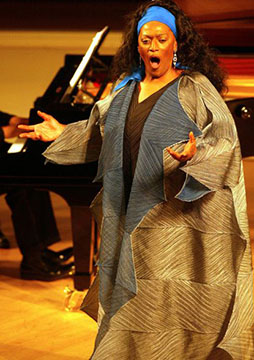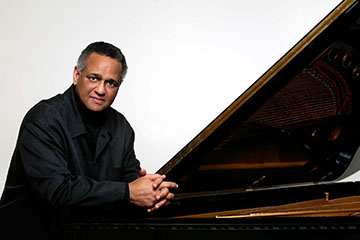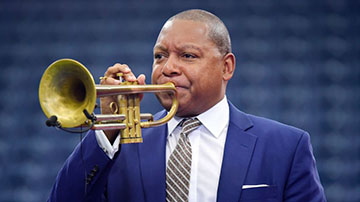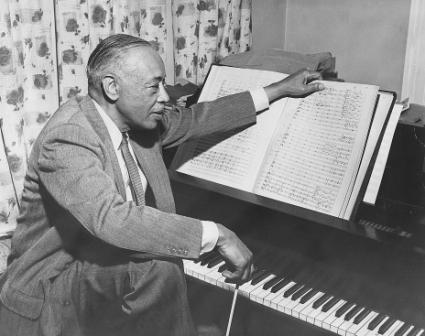
Jessye Norman
Jessye Norman
Any catalogue of the most spectacular black performers in the world of classical music has to begin with Jessye Norman (1945-2019). She possessed one of the world’s most beautiful and powerful voices with a glorious rich middle and low register, described as a “grand mansion of sound… that opens onto unexpected vistas.” Norman grew up in a seemingly hopeless environment of hate and prejudice, but inspired by the great Marian Anderson, she won scholarships at Howard University, the Peabody Conservatory and the University of Michigan. Finding early successes on European stages, critics hailed her as having “the greatest voice since Lotte Lehmann.”
Infusing lyrical melodies with a powerful sense of drama, Norman was considered one of the most popular and highly regarded dramatic soprano singers in the world. She sang at the inauguration of Ronald Reagan, and the 60th birthday celebration of Queen Elizabeth II. She even sang the French national anthem on the Place de la Concorde in Paris to celebrate the 200th anniversary of the French Revolution in 1989. Norman was one of the most prominent singers of the 20th century, with her “opulent tone combining with a regal stage manner to produce performances full of dramatic power and unrivaled passion.” Norman became a highly visible ambassador of music, and she continued to push boundaries by exploring crossover and other popular forms of music. But what is even more important, Norman became passionately involved in educational and outreach projects, among them founding the “Jessye Norman School of Arts” in her home state of Georgia.
George Augustus Polgreen Bridgetower

George Augustus Polgreen Bridgetower
A remarkable performance took place on 24th May 1803 at the Augarten Palace Park Pavilion in Vienna. At the unusual hour of 8am in the morning, Ludwig van Beethoven and the violinist George Augustus Polgreen Bridgetower premiered a new violin sonata. Bridgetower, son to a Polish mother and a father of African ancestry, was a child prodigy. He played his Parisian debut to rave reviews at the age of 10, and within the same year performed in London, Bath, and Brighton, with King George III praising the “exquisite performance.” At the tender age of 14, Bridgetower was appointed first violinist at the private orchestra of the Prince of Wales, and he embarked on a concert tour of Europe in 1802. That’s when he made friends with Beethoven, who described Bridgetower as “an absolute master of his instrument.”
Bridgetower urged Beethoven to compose a new Violin Sonata, and Beethoven took the final movement from an earlier sonata and composed a new first and second movement. The sonata was delivered to Bridgetower only one day before the performance. Everybody assembled, including the British ambassador, Archduke Rudolph and numerous patrons of the arts. In the first movement Beethoven had written a huge run just for piano, spanning several octave. In the repeat, after Beethoven executed the run, Bridgetower imitated it on the violin. Supposedly, “Beethoven looked up from the piano in astonishment, ran across the stage, embraced Bridgetower, ran back to the piano and continued playing.” The performance was a triumphant success, and afterwards Beethoven announced that he would dedicate the new sonata to Bridgetower, writing on top of the title page, “Sonata per uno mulaticco lunattico.” Sadly, their relationship turned sour after Bridgetower supposedly insulted a woman that Beethoven held dear. No one knows who she was, or what was said but Beethoven was outraged and demanded the return of the manuscript. He withdrew the initial dedication, and granted it to Rodolphe Kreutzer instead. The ultimate irony is that Kreutzer never performed his sonata, claiming it was unplayable and “outrageously unintelligible.” So next time you hear the “Kreutzer Sonata,” keep it mind that it should always have been the “Bridgetower Sonata.”
Ludwig van Beethoven: Violin Sonata No. 9, Op. 47 “Kreutzer” (Itzhak Perlman, violin; Martha Argerich, piano)
André Watts

André Watts
André Watts (b. 1946) entered his first piano competition at the age of 9, and playing a Haydn Concerto took the first prize triumphing over 40 fellow competitors. The reward for winning the competition was a performance at the Philadelphia Orchestra Children’s Concerts. At the age of 10 he performed the Mendelssohn G minor concerto with the Robin Hood Dell Orchestra, and at 14 the Symphonic Variations by Franck with the Philadelphia Orchestra. At the age of 16 he auditioned at Carnegie Recital Hall in a competition to play in Leonard Bernstein’s televised “Young People’s Concert Series,” with the New York Philharmonic. Bernstein was over the moon when he first heard Watts, and the pianist performed the Liszt Piano Concerto No. 1 in E-flat at a Young People’s Concert on January 12, 1963. It was videotaped and nationally televised on CBS on January 15, 1963.
Just a couple of weeks later, Bernstein asked Watts to fill in for the ailing Glenn Gould, the scheduled soloist for the New York Philharmonic’s regular subscription concert. Watts again played the Liszt E-flat Concerto, and when he had sounded his final cadenza, the whole orchestra joined the audience in a standing ovation. Given that kind of exposure, Watts soon appeared on stages around the word, and by 1969 he was booked three years in advance. He signed lucrative recording contracts and was giving 150 concerts, recitals and chamber performances a year. In 1976, at age thirty, he celebrated his tenth consecutive appearance in the Lincoln Center Great Performers Series at Avery Fisher Hall. The PBS Sunday afternoon telecast was the first solo recital presented on “Live from Lincoln.” Watts went on to join the faculty at Indiana University, where he holds an Endowed Chair in Music.
The Marsalis Family

Wynton Marsalis
Music has always been part of the Marsalis family DNA. Wynton is a virtuoso trumpeter, composer and artistic director of Jazz at Lincoln Center, while Branford is a virtuoso saxophonist, composer and bandleader. Their father Ellis Marsalis Jr. is a world-renowned jazz pianist, and their brother Delfeayo is a trombonist while Jason is a drummer. And while this exceptional family is highly active in the field of Jazz, Wynton and Branford are also known on the Classical stage. In fact, Wynton intended to pursue a career in classical music, and he performed the famous Haydn trumpet concerto with the New Orleans Philharmonic at age fourteen. He eventually focused on a career in Jazz, but he was the only musician ever to win Grammy Awards in Jazz and Classical music during the same year. Wynton is an internationally acclaimed musician, composer and bandleader, and also an educator and leading advocate of American culture. He has elevated the “quality of human engagement for individuals, social networks and cultural institutions throughout the world.”
Black performers do matter, and they have made invaluable contributions to society, music and the arts. They have broken down racial barriers, shattered glass ceilings, and became internationally recognized superstars. The questions remains as to what kind of impact they have made in their own community?





